1886 Confederate General ROBERT E LEE History STONEWALL JACKSON Civil War C. S. A
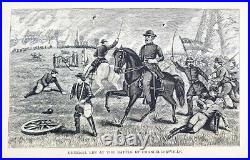



Is for an 1886 FIRST EDITION! Of " THE CAMP-FIRES OF GENERAL LEE, FROM THE PENINSULA TO APPOMATTOX COURT-HOUSE " by Edward S. YOU'LL LOVE THIS BOOK!!
It is filled with 414 detailed and informative pages of history pertaining to the military life of General Robert E. Lee and the part played by the. It includes reminiscences of the March, the Camp, the bivouac (military camps) and personal adventures of brilliant maneuvers and tremendous battles. Covered in this publication are the Camp-Fires in the Peninsula, Northern Virginia, Antietam, Fredericksburg, Chancellorsville, Gettysburg, and of course.
On the evening of April the 8th, General Robert E. Lee and the remnants of his once-proud Army of Northern Virginia arrived in Appomattox County one step ahead of the pursuing Federal Army. Lee's hope was to reach Appomattox Station on the South Side Railroad where supply trains awaited. Having moved ahead of the rest of Lee's army, Gen.
Lindsay Walker led a detachment of reserve artillery to bivouac near the station. It was not long after their arrival that Federal cavalry, riding hard from the south, attacked the waiting supply trains and then assaulted Walker. This cavalry, under command of GENERAL PHILLIP SHERIDAN, was merely a harbinger of the fast approaching Federal columns. Sheridan's horsemen repelled Walker's detachment -- Lee's much-coveted supplies were now in enemy hands. In the meantime, the majority of Lee's forces were setting up a temporary camp one mile north of Appomattox Court House -- the small town lying between the Confederates and the station.
Word of the victorious Federal advance soon reached the camp. The beleaguered Confederates realized that Grant's men had the upper hand. The expectation was validated when, at 2:00 A. On the morning of April 9th, Lee ordered General Gordon's II Corps to move into line of battle west of Appomattox Court House. Lee had met with Generals Gordon, Longstreet, and his nephew, Gen. Fitzhugh Lee earlier that evening and decided to throw a portion of his infantry against Sheridan's men.He certainly did not expect to have to fight Federal infantry, believing that he had out-marched most of Grant's troops moving west from Farmville. Lee's cavalry spearheaded the advance, and the lines of scattered, grey-clad infantrymen lurched forward; most men somnolent from their early rising yet nervous with the anticipation that manifests itself before an impending battle. As the line moved up the sloping ridge along the Richmond-Lynchburg Stage Road, the enemy came into view. It now became apparent to Gordon that Lee had grossly underestimated the Federal strength.
In truth, Grant had not only positioned more cavalry in front of Lee during the night, but had also force-marched almost three entire corps of infantry along the South Side Railroad to arrive at Appomattox Station during the night. Most of the Army of the James under Gen. Edward Ord -- the XXIV and elements of the XXV (United States Colored Troops) --- had moved to block Lee's western escape route with the Army of the Potomac's V Corps in tow. Gordon and his battle-worn foot soldiers now faced advancing lines of dark blue-clad Federal infantry -- men of the XXIV and XXV Corps. As Gordon's men began to skirmish with the Federal Infantry, two Cavalry divisions converged on the Confederate lines alongside infantry of Griffin's V Corps.It was only a matter of time before Gordon's men broke. The Confederates withdrew from their advanced positions and General Lee ordered truce flags sent out at about 11:00 that morning. Meanwhile, back at his camp, Lee was deep in decision.
Not only had Gordon been defeated to his front, but Federals of the II and VI corps had pinned Longstreet's rearguard in from the north. Grant had surrounded Lee on three sides, leaving the northwest as his only unimpeded route.
Lee knew that there was no hope of supplying his army by retreating in that direction. He was in " CHECKMATE ": he had no other options left. The disconsolate Lee sent word to Grant that he was prepared to surrender the Army of Northern Virginia. Negotiations began between General Robert E.Lee and General Ulysses S Grant in the McLean House near Appomattox Court House, and the terms of surrender were agreed upon. THE LAST CAMP-FIRE OF GENERAL LEE WAS EXTINGUISHED.
Published in 1886, this book is in VERY GOOD CONDITION! For its age and especially for being 136 YEARS OLD!!! And firmly bound with NO TEARS! It measures 5 1/2" X 7 3/4" and is complete with all 414 pages.
GET IT WHILE YOU CAN!! Please see our other books too!